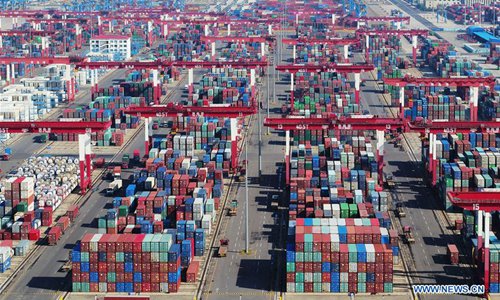Embassy refutes Western smearing against economy
Faced with rhetoric from Western politicians and media outlets that have launched a renewed smear campaign against the growth of the world’s second-largest economy, the Chinese Embassy in France published an article on its official website defying their ill-intended claims.
The article offered a targeted response to the dire claims hyped by the West, including China’s weak domestic demand, the risk of deflation, the property sector being in a crisis, and a high youth unemployment rate.
To compare horizontally, it could be easily seen that China is still undoubtedly an important engine of global economic growth. Taking the major economies’ growth in the second quarter as an example, China far outpaced others with a 6.3 percent growth rate.
US’ GDP grew 2.4 percent in the same period, while the UK economy expanded by 0.4 percent and that of France by 0.9 percent, while Germany’s economy contracted 0.1 percent.
If China’s economy “is out of breath” as some Western media have described, “then other economies may be in the ICU (intensive care unit),” the article said.
However, some people in the West chose to be “selectively blind,” ignoring the outstanding performance of China’s economy. They deliberately amplify the normal fluctuations of some economic indicators with “lower than expected” claims in an attempt to confuse the international community and disrupt China’s decision-making, it added.
“What they care about is not whether the Chinese economy is doing well, but whether the Chinese government will generously rescue international investors who are trapped in the debts of real estate firms under the pressure of public opinion, and whether China will over-extend itself and introduce a large-scale stimulus plan again to benefit certain Western economies. They want to shift the responsibility for the weak recovery of the world economy to China,” the embassy remarked.
Refuting the claim of sagging domestic demand, the embassy said China’s economy maintains continuous recovery momentum, citing official indicators.
China’s economic output expanded 5.5 percent in the first half of the year, the fastest among major economies. The contribution made by domestic demand reached 110.8 percent over the period, an increase of 59.4 percentage points year-on-year, of which the contribution from consumption hit 77.2 percent, according to China’s National Bureau of Statistics.
Despite sluggishly growing world trade, China’s exports showed robust resilience, registering a 1.5 percent increase in the first seven months of the year, data from the Chinese customs authority showed.
Export declines in certain months since the start of the year, which the West has watched closely, have been entirely caused by shrinking external demand and a high comparison base last year, the ebassy said in the article, adding that China has no fundamental conditions for deflation as some Western media have hyped in relation to the consumer price index, which has been running low over recent months.
The article also justified the dampened property sector, saying that with the market adjustment mechanism gradually taking effect, short-term risks will be resolved and market confidence will be boosted accordingly, while refuting the “Lehman moment” claim.
As for the high unemployment rate, the article elaborated that the youth unemployment rate of 21.3 percent in June did not mean that one out of five was unemployed, since a large number of young people who are still in school and don’t want a job are not included in the statistics.
The decision that China will suspend the release of youth unemployment figures “is not to cover up something, but to further improve the statistical work,” as it is debatable whether it is reasonable to use the 16-24 age group as the target to calculate the figures, the embassy said.
It is natural that the domestic economic recovery in the post-COVID period encounters some obstacles and challenges, which have been shown by certain economic indicators, Hu Qimu, a deputy secretary general of the digital real economies integration Forum 50, told the Global Times, adding that it generally takes two to three quarters to get an economic recovery back on the normal track.
In terms of “low confidence” in the economy as hyped by Western media, Hu believed that with more stimulus measures landing, China’s economic and business environment will be further improved, bolstering investor confidence and expectations.
Biased remarks by some US politicians and media outlets about China’s economic outlook are part of a broader political campaign in the US to divert attention away from its domestic challenges during a presidential election cycle that is heating up, analysts said.
US President Joe Biden is trying to underscore China’s challenges in a bid to cover up his own failures at home, they said.
Earlier this month, Biden called China’s economy a “ticking time bomb,” even though he, known for his gaffes during speeches, was widely wrong on the numbers.
Rating agency Fitch Ratings recently downgraded the US government’s top credit rating, citing fiscal deterioration over the next three years and a steady deterioration in governance over the past two decades, marking only a second time in history that the US has been stripped of its top-tier credit rating.
(Global Times)




